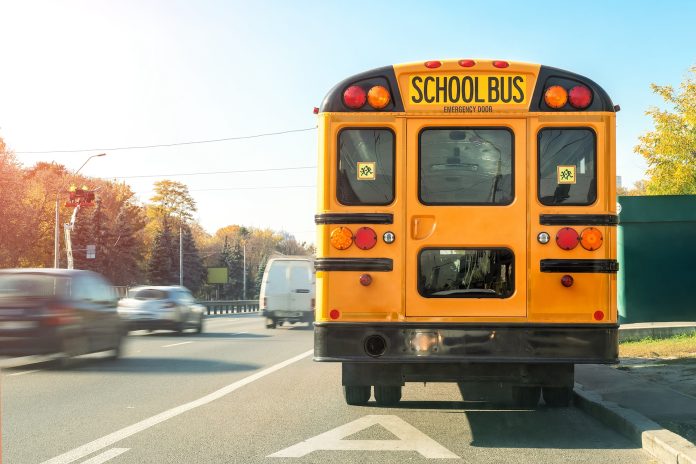Some say that public education is a “recession-proof” industry, but the Great Recession of the mid-2000s taught us that no line of work can emerge from a recession unscathed.
One thing the Great Recession showed us is that an infusion of federal stimulus funds may have been helpful, but when funds dry up, state and local revenues decline, leaving districts in a quandary about how to respond. All indications are that we are headed into another challenging fiscal time for public education. While student learning may not be affected directly during a recession, non-instructional services often are notably impacted, including transportation, utilities, student services, student activities, and technology. But why?
When budgets are tight because less money is flowing into school districts, leaders endeavor to keep cuts as far away from the classroom as possible. Don’t be fooled: The recent boom of one-time funds and the protection of positions in transportation were nice while they lasted, but the new COVID world heading into a recession will not be immune to difficult budget conversations. So, what can transportation leaders do to recession-proof their departments?
Tighten up staffing, but don’t shortchange the value of training. School bus drivers, mechanics and dispatch staff are all a premium that a department should keep during a recession. Cut the fat but not positions that are required for your department to run safely. Efficiency may take a hit, but remember that it is temporary. With cross-training, your staff will adapt. A well-trained scheduler can save the district tens of thousands of dollars. Similarly, a bus driver, who can also serve as a bus driver trainer, can allow more flexibility and fewer external contracts. Teach your staff to be adaptable. Past recessions have shown that education thrives during a recession, as it signals hope for a better position or opportunity when the recession does end. Your staff is no different. Use this time to prepare them for opportunities when the high times do come.
Upgrade your technological expertise. Transportation professionals in a leadership position should leverage online learning processes for the employees in their teams and automate IT processes wherever possible. Embrace the innovations in the industry and implement new technology with a return-on-investment plan that’s aligned with the district’s goal, mission and vision.
Tie spending to essential student programs and services. COVID taught us that the use of technology is a critically important learning tool, so think about how you use it in your transportation department. The safe and efficient movement of students should be positioned as a way to increase average daily attendance (ADA) and prevent the district from losing money due to absences. For example, if the student services or the attendance department can run reports for chronically truant students, create heat maps to better understand where they live. Can a bus route be added or redesigned to eliminate getting to school as a barrier to their learning? Not only will this impact district revenue, but it will also increase instructional access, potentially resulting in less mediation.
Consider multi-year contracts. During a recession, vendors may experience increased costs and pass them on to districts. Carefully negotiated, multi-year contracts can help lock in subsequent years at a reduced or stable rate. Contracts that should be explored include necessary parts and materials, external transportation services, data systems, and more. Money upfront can be a bargaining chip for reduced rates into the future to stay with those providers, assuming that any indirect costs to change to a competitor, don’t outweigh the savings.
Reduce overhead through cooperative agreements. If you haven’t already joined a co-op, a board resolution with a commitment to participate starts the process. The advantage is that competitive prices can be obtained without a lot of haggling or time-consuming negotiations. This may be a great time to lock in labor or parts prices for the next two years. Negotiating with parts vendors now may save you precious budget dollars later, so bring your purchasing staff in to assist you with thinking this through. Most vendors that you have a past relationship with will work to secure future business, even if it’s at a lower margin. Ten percent is going to be your target. Try and reduce your operations by that figure.
Look for new ways to deliver value. Look for low-cost alternatives in fuel, parts and services. Now would be a great time to go out to bid for outside transportation partners, or maybe consider strategies to bring the outside transportation of students in-house as much as possible. It goes without saying that our departments are spread thin and will encounter resistance from staff to begin with. Offer your services to outside entities (county, city and even other districts) that are looking for lower-cost solutions to transportation. When you can, step in and out-bid charter companies. Not only does this bring in added revenue to your district, but it will also offset your own cutbacks and keep your staff busy.
Stay up to date with industry trends. Even in an economic downturn, technology is advancing weekly. Tapping into professional networks and transportation organizations will help teams be focused on current events, hear about the latest and greatest inventions as they emerge, and learn about best practices that allow the department to work faster, better and more cost-effective.
Aside from these recommendations, many practices exist that are simply good business and good leadership tools. It is always important to build great relationships with your district’s fiscal and human resource leaders, communicating early and often on what your needs are for an efficient, functional department. Being proactive may pay off at a later date. When the downturn does come, they may not ask you to cut, as they know you have already made the necessary adjustments.
After the last two-and-a-half years of COVID-induced challenges, money remains a hot topic in public education, and the uncertainty of a recession impacts spending dramatically. Recession-influenced spending cuts can significantly impact a transportation department. Because the ill-effects of a recession through reduced spending can be felt for years to come, start positioning and proactively strategizing how to best lead your department’s needs right now.
Editor’s Note: As reprinted in the July 2022 issue of School Transportation News.
Related: Granite City Community Unit School District #9 Selects First Student as New Transportation Partner
Related: Did you use pandemic “downtime” to install safety technology on your school buses?
Related:July 2022
Related: Smart Technology Assists Calif. District with Fleet Electrification
Cristian Lepe is the transportation coordinator for the Mt. Diablo Unified School District and a recipient of the California Association of School Business Official’s 2022 Magnificent Seven Award (a reference to Dr. Stephen Covey’s “Seven Habits of Highly Effective People). Dr. Lisa Gonzales is the chief business officer at Mt. Diablo Unified School District and the Association of California School Administrators 2022 Business Leader of the Year.
















